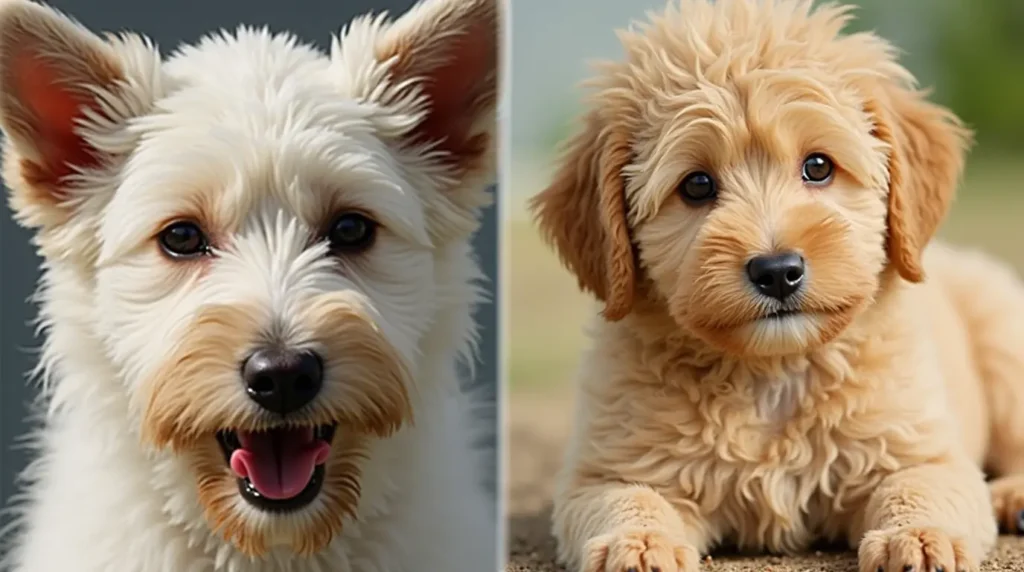Introduction: Is the German Shepherd Poodle Mix the Right Dog for You?
Are you searching for a dog that combines intelligence, hypoallergenic traits, and energetic playfulness? The German Shepherd Poodle mix, often called the Shepherdpoo, could be the perfect companion. This hybrid dog brings together the sharp mind of the German Shepherd and the low-shedding coat of the Poodle, creating a loyal, intelligent, and hypoallergenic dog. Whether you’re a first-time dog owner or an experienced one, you’ll want to know all about this amazing mix. Keep reading to find out if this breed is right for you.
What is a German Shepherd Poodle Mix?

The Origins of the German Shepherd Poodle Mix
The German Shepherd Poodle mix, also known as Shepherdpoo, is a hybrid breed that combines two well-loved dogs: the German Shepherd and the Poodle. The mix can take after either parent, but they are often known for their intelligence, hypoallergenic coats, and friendly, social nature. This crossbreed aims to bring the best qualities of both breeds into one dog, making it a sought-after option for dog lovers worldwide.
The German Shepherd, a well-known working dog breed, is revered for its loyalty, intelligence, and versatility. It’s commonly seen as a police dog, service dog, or family pet. On the other hand, the Poodle is famous for its hypoallergenic coat, making it an ideal choice for individuals with allergies.
Related: German Shepherd Poodle Mix for Sale Traits You’ll Love
What Makes the Shepherdpoo So Special?
When you combine these two breeds, you get a dog that has the best of both worlds. These dogs inherit the German Shepherd’s intelligence and the Poodle’s non-shedding, curly coat. The German Shepherd Poodle mix tends to be highly trainable, affectionate, and hypoallergenic, making it a fantastic choice for families, singles, or anyone seeking an active and loyal companion.
Are German Shepherd Poodle Mixes Affectionate?
The German Shepherd Poodle mix, or Shepadoodle, is a highly affectionate and loyal companion. Combining the protective nature of the German Shepherd with the sociable demeanor of the Poodle, this mix thrives on bonding with its family. Their loving temperament makes them ideal for families and individuals seeking a devoted and playful pet.
Are German Shepherd Poodle Mixes Good With Other Animals?
The German Shepherd Poodle mix is generally good with other animals, especially when socialized early. Their Poodle side brings friendliness, while the German Shepherd’s protective instincts encourage harmony. With proper training and exposure, they can coexist peacefully with pets, making them a versatile choice for multi-pet households seeking a balanced and amicable companion.
Are German Shepherd Poodle Mixes Aggressive?
The German Shepherd Poodle mix is not typically aggressive. They inherit intelligence and loyalty, balancing the Poodle’s gentleness with the German Shepherd’s protective nature. Proper training and socialization are key to fostering their friendly disposition. This hybrid breed often thrives as a loving companion, making them suitable for families and social environments.
Are German Shepherd Poodle Mixes Easy to Train?
The German Shepherd Poodle mix is highly trainable, thanks to its intelligence and eagerness to please. This hybrid combines the German Shepherd’s discipline with the Poodle’s quick learning abilities. Consistent training, positive reinforcement, and mental stimulation can make teaching commands and tricks an enjoyable experience for both owner and dog.
Are German Shepherd Poodle Mixes Good Service Dogs?
The German Shepherd Poodle mix excels as a service dog, blending intelligence, loyalty, and adaptability. With the German Shepherd’s strong work ethic and the Poodle’s problem-solving skills, this hybrid is ideal for tasks like mobility assistance or emotional support. Their trainability and gentle demeanor make them reliable companions in various service roles.
What Should a German Shepherd Poodle Mix Eat?
A German Shepherd Poodle mix thrives on a balanced diet rich in high-quality protein, healthy fats, and essential nutrients. Opt for premium dog food tailored to active breeds, supplemented with fresh vegetables and occasional lean meats. Avoid fillers and artificial additives to support their energy, coat health, and overall vitality.
How to Find a German Shepherd Poodle Mix Breeder
To find a reputable German Shepherd Poodle mix breeder, research breeders with ethical practices and strong reviews. Visit facilities to assess cleanliness and care standards. Ensure health certifications for both parent breeds. Ask about the puppy’s lineage, socialization, and medical history. Prioritize breeders focused on health and temperament over profit.
German Shepherd Poodle Mix Appearance

Coat Type: A Curly, Low-Shedding Coat
The German Shepherd Poodle mix typically inherits the Poodle’s curly, hypoallergenic coat, which is perfect for individuals with allergies. While the German Shepherd has a dense, straight double coat, the Shepherdpoo’s coat is much more manageable, shedding minimally. This low-shedding trait reduces dander in the home, which helps minimize allergic reactions.
Coat Care: While the Shepherdpoo’s coat is hypoallergenic, it still requires regular grooming. Brushing at least 2-3 times a week and occasional professional grooming is recommended to prevent tangling and matting. Their coat may be wavy, curly, or even straight depending on the traits inherited from the parent breeds.
Size and Build: A Medium-Large Dog
A German Shepherd Poodle mix generally stands between 18 to 24 inches tall at the shoulder and weighs between 40 to 70 pounds. The size of your Shepherdpoo can depend on whether the Poodle parent was a standard or mini Poodle. Despite their size, these dogs are muscular, agile, and built for endurance.
Are German Shepherd Poodle Mixes Purebred?
The German Shepherd Poodle mix is not considered purebred but a hybrid, blending traits from two distinct breeds. This intentional cross combines intelligence and loyalty from the German Shepherd with the Poodle’s hypoallergenic coat and adaptability. While not recognized by major kennel clubs, these mixes offer unique qualities cherished by many owners.
Related: German Shepherd Lab Mix: The Loyal, Fun, and Perfect Family Dog
Temperament of the German Shepherd Poodle Mix

1. Personality: The Best of Both Breeds
One of the most remarkable aspects of the German Shepherd Poodle mix is its temperament. These dogs are known for being intelligent, loyal, and affectionate. The German Shepherd parent brings alertness and confidence, while the Poodle parent contributes an outgoing, friendly disposition. The result is a dog that is well-balanced, friendly, and highly trainable.
Social and Friendly: Shepherdpoos tend to get along well with children and other pets, especially if they are socialized early. Their friendly nature makes them excellent companions and even better family dogs.
Loyalty and Bonding: These dogs are incredibly loyal and often form a strong bond with their family members. They are affectionate and enjoy spending time with their human companions.
2. Energy Level: High Energy and Playful
The German Shepherd Poodle mix is an energetic dog that requires regular physical activity. These dogs are playful and enjoy activities such as fetch, swimming, running, and hiking. Without enough exercise, they may become bored, which could lead to destructive behavior.
Mental Stimulation: Both parent breeds are highly intelligent, so Shepherdpoos also need mental stimulation to stay happy. Engaging them in activities like puzzle toys, obedience training, and agility courses can help them burn off energy while also keeping their minds sharp.
Related: 5 King Shepherd Puppies for Sale: Find Your Perfect Match
Training Your German Shepherd Poodle Mix
1. Intelligence and Trainability
The German Shepherd Poodle mix is one of the smartest hybrid breeds around. Thanks to the German Shepherd’s intelligence and the Poodle’s eagerness to please, Shepherdpoos excels in training. Whether you’re teaching basic commands or complex tricks, they tend to pick up on training quickly. This makes them an excellent choice for first-time dog owners, provided they are committed to the time and energy required for consistent training.
Training Tip: Positive reinforcement, such as treats and praise, works best with this breed. Keep training sessions fun and rewarding to avoid boredom.
2. Socialization Needs
Early socialization is important for Shepherdpoos, especially since they can sometimes inherit a protective nature from the German Shepherd parent. Exposing them to different people, animals, and environments at a young age helps them grow into well-adjusted, friendly dogs. This will also ensure they are comfortable in various situations.
Related: Why Sheepadoodle puppies make the best pets
Grooming and Care for Your German Shepherd Poodle Mix
1. Regular Grooming
Although the German Shepherd Poodle mix has a hypoallergenic coat, they require regular grooming. Their curly fur can become matted if not maintained properly. Regular brushing (about 2-3 times a week) and professional grooming every 6-8 weeks will keep your dog’s coat healthy and looking its best.
Bathing: Bathe your Shepherdpoo every 4-6 weeks to keep its coat clean and fresh. Use a gentle, dog-safe shampoo that helps maintain their coat’s natural oils.
2. General Hygiene
Along with grooming their coat, you’ll need to regularly clean their ears, trim their nails, and brush their teeth. This ensures your dog stays healthy and free from common health issues.
Exercise Needs of the German Shepherd Poodle Mix
1. Physical Exercise
As an active dog, the German Shepherd Poodle mix requires daily physical exercise to maintain a healthy weight and prevent boredom. They thrive on activities like daily walks, runs, and playing in the yard. Aim for at least 1 hour of exercise daily, but more is better for this energetic breed.
Outdoor Activities: Shepherdpoos love outdoor adventures. If you enjoy hiking, swimming, or running, your German Shepherd Poodle mix will likely enjoy joining you on these activities.
2. Mental Stimulation
Given their high intelligence, Shepherdpoos need mental stimulation just as much as physical exercise. Interactive toys, training sessions, and agility courses are great ways to keep their minds engaged and satisfied.
Health Considerations for the German Shepherd Poodle Mix
1. Common Health Issues
While hybrid breeds are generally healthier than purebred dogs, the German Shepherd Poodle mix can still inherit health issues from both parent breeds. Some potential health problems include:
- Hip and elbow dysplasia: Common in large breeds like the German Shepherd.
- Progressive retinal atrophy (PRA): A hereditary eye condition found in Poodles.
- Allergies: Although rare, Shepherdpoos can sometimes develop allergies due to their hypoallergenic coat.
2. Lifespan
The average lifespan of a German Shepherd Poodle mix is between 10 to 15 years. With proper care, a healthy diet, and regular vet check-ups, these dogs can live long, happy lives.
Is the German Shepherd Poodle Mix the Right Dog for You?
Ideal Families
The German Shepherd Poodle mix is an ideal choice for active families who have the time and space for this energetic dog. They love being around people, so they’re great for households with children or other pets.
Hypoallergenic Qualities
If you or a family member suffer from allergies, this breed could be the right choice. The Shepherdpoo’s curly, low-shedding coat reduces allergens in the home, making it easier for allergy sufferers to enjoy the companionship of a dog.
Is a German Shepherd and a Poodle a good mix?
The German Shepherd Poodle Mix, also known as the Shepadoodle, combines intelligence, loyalty, and adaptability. This hybrid is ideal for active families, offering the trainability of a German Shepherd and the hypoallergenic coat of a Poodle, making it a versatile companion.
Are shepadoodles hard to train?
The German Shepherd Poodle Mix, or Shepadoodle, is generally easy to train due to its high intelligence and eagerness to please. Consistent training, positive reinforcement, and early socialization help harness this breed’s natural aptitude for learning.
What are the characteristics of a German Shepherd Poodle mix?
The German Shepherd Poodle Mix combines the loyalty and bravery of a German Shepherd with the intelligence and hypoallergenic traits of a Poodle. This hybrid is energetic, highly trainable, and social, making it an excellent companion for active families.
Is a Shepadoodle a good dog?
The German Shepherd Poodle Mix, often called a Shepadoodle, is a fantastic dog for families seeking a loyal, intelligent, and playful companion. With proper training and socialization, this hybrid excels in adaptability, forming strong bonds with its owners.
Conclusion: Should You Get a German Shepherd Poodle Mix?
The German Shepherd Poodle mix is a wonderful dog for families, active individuals, and allergy sufferers. With their intelligence, hypoallergenic coat, and friendly demeanor, these dogs can make great companions. If you’re prepared to provide the exercise, grooming, and training they need, the Shepherdpoo could be the perfect dog for you.
FAQs:
1. How big do German Shepherd Poodle mixes get?
A German Shepherd Poodle mix usually weighs between 40-70 pounds and stands 18-24 inches tall.
2. Are German Shepherd Poodle mixes good for first-time dog owners?
Yes, they are highly intelligent and trainable, making them a good option for first-time dog owners.
3. Do German Shepherd Poodle mixes shed a lot?
No, they are low-shedding dogs due to their Poodle heritage, making them a great choice for allergy sufferers.
4. How much exercise does a German Shepherd Poodle mix need?
They require at least 1 hour of exercise every day, along with plenty of mental stimulation.
5. Are German Shepherd Poodle mixes hypoallergenic?
Yes, their curly coats are hypoallergenic, although some shedding and dander may still occur.
6. What are common health problems with German Shepherd Poodle mixes?
They may experience issues like hip dysplasia, elbow dysplasia, and progressive retinal atrophy (PRA).
7. How long do German Shepherd Poodle mixes live?
They typically live between 10-15 years.

